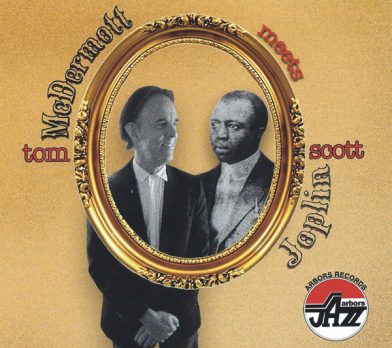In the early 1970s, ragtime jazz was considered about as cool as Mantovani. Marvin Hamlisch, whose interpretation of Scott Joplin’s “The Entertainer” reached number one on the Billboard charts, was Lisa Loopner’s (Gilda Radner) favorite artist in the Saturday Night Live sketch “The Nerds.” But ragtime was far more than just a Neanderthal music waiting for the missing link that would turn it into the homo sapiens of jazz; we just didn’t know much about it because none of it was recorded in the time that it was written, and the sheet music offered no insight into what might have been happening to those rags when the real-life fingers of ragtime’s fierce competitors engaged in night-long cutting contests in the latter years of the 19th century. It took visionaries to see past the formal limitations of notation, and animate this music in a more dynamic sense.
 St. Louis native Tom McDermott was hard wired to the ragtime culture that flourished in his hometown, and mastered the nuances of the form before the lure of James Booker brought him downriver to New Orleans for good. McDermott’s deconstruction of pan-African music forms led him to see similarities between rags and Brazilian choros, and his work has been rife with instructive comparisons between the two that suggest how much more vital ragtime must have been than the nostalgia music it was once considered . McDermott is not alone in these pursuits, of course, but he has shown a singular ability to animate this music in a contemporary context while remaining true to its foundations. We’ve seen examples of this on previous albums, but Tom McDermott Meets Scott Joplin is his first full recording to really dive into ragtime, and it’s a bit of a revelation.
St. Louis native Tom McDermott was hard wired to the ragtime culture that flourished in his hometown, and mastered the nuances of the form before the lure of James Booker brought him downriver to New Orleans for good. McDermott’s deconstruction of pan-African music forms led him to see similarities between rags and Brazilian choros, and his work has been rife with instructive comparisons between the two that suggest how much more vital ragtime must have been than the nostalgia music it was once considered . McDermott is not alone in these pursuits, of course, but he has shown a singular ability to animate this music in a contemporary context while remaining true to its foundations. We’ve seen examples of this on previous albums, but Tom McDermott Meets Scott Joplin is his first full recording to really dive into ragtime, and it’s a bit of a revelation.
The record is a love song to Joplin that mixes right-off-the-page renditions of Joplin classics with McDermott’s own interpretations and variations on other pieces. The opening piece, “Easy Winners,” as well as “Gladiolus Rag,” “Magnetic Rag,” and “Fig Leaf Rag,” all offer a look at the bright melodies and verse-to-verse progressions of Joplin’s written work. The internal rhythm, McDermott points out, owes much to Cuban habaneros, which were first published in 1805.
But McDermott takes it further. He closes the album with three songs from his 2004 release Choro do Norte—“Swipesy Cakewalk,” “Heliotrope Bouquet,” and “The Chrysanthemum,” a spectacular piece with a New Orleans-Brazilian band featuring Evan Christopher on clarinet, Rick Trolsen on trombone, Segio Krakowski on pandeiro, Henry Lentino on bandolin and Ciao Marcio on guitar. On “Rosebud March,” McDermott’s predilection for James Booker improvisations shows itself in his left hand. “The Entertainer” is similarly Bookerized. Jelly Roll Morton’s take on ragtime is evident on McDermott’s versions of “The Strenuous Life,” and “Searchlight Rag.”
The crowning moment of this record comes when McDermott lets it all hang out, by bringing his improvisational wit and technique to bear on Joplin’s most famous composition, “Maple Leaf Rag,” a joyous romp that makes Joplin sound as contemporary as a sunny afternoon.




